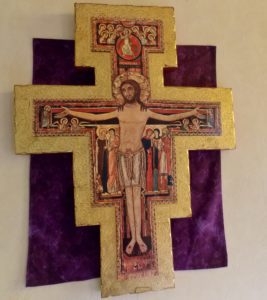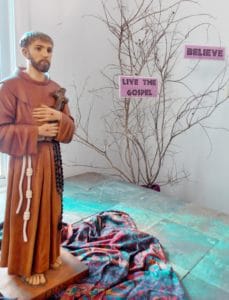Find some Lenten wisdom in this collaborative Franciscan Gospel post. The weekly Sunday Gospel reflection and questions are written by Fr. Paul Gallagher, OFM. They are edited by Franciscan Sister of Christian Charity Sister Anne Marie Lom and Joe Thiel. The excerpts from the Sunday readings are prepared by Joe Thiel. If you would like to read or download the complete pdf with excerpts for your prayer, please click here: Franciscan Gospel Reflection March 4 2018 Excerpts from the Lectionary for Mass for Use in the Dioceses of the United States of America, second typical edition © 2001, 1998, 1997, 1986, 1970 Confraternity of Christian Doctrine, Inc., Washington, DC. Used with permission. All rights reserved. No portion of this text may be reproduced by any means without permission in writing from the copyright owner. Please include this information when printing.
Photos: St. Francis of Assisi Parish, Greenwood, Mississippi
John 2:13-25
Since the Passover of the Jews was near, Jesus went up to Jerusalem. He found in the temple area those who sold oxen, sheep, and doves, as well as the moneychangers seated there. He made a whip out of cords and drove them all out of the temple area, with the sheep and oxen, and spilled the coins of the moneychangers and overturned their tables, and to those who sold doves he said, “Take these out of here, and stop making my Father’s house a marketplace.”
His disciples recalled the words of scripture, “Zeal for your house will consume me.”
At this the Jews answered and said to him, “What sign can you show us for doing this?” Jesus answered and said to them, “Destroy this temple and in three days I will raise it up.” The Jews said, “This temple has been under construction for forty-six years, and you will raise it up in three days?” But he was speaking about the temple of his body. Therefore, when he was raised from the dead, his disciples remembered that he had said this, and they came to believe the scripture and the word Jesus had spoken.
While he was in Jerusalem for the feast of Passover, many began to believe in his name when they saw the signs he was doing. But Jesus would not trust himself to them because he knew them all, and did not need anyone to testify about human nature. He himself understood it well.
Background
Most of us associate this event in the life of Jesus with the end of his life. Matthew, Mark, and Luke present their accounts of Jesus driving the merchants from the temple at the end of their gospels. In their narratives, this is the event that leads the religious leaders to the decision to have Jesus arrested and executed. In vivid contrast, John’s gospel places this account at the very beginning, in the second chapter. Also, in John’s gospel, Jesus goes to Jerusalem three different times (John 2:13, 5:1, and 12:12). Scripture scholars believe that John wants to lay out the fullness of who Jesus is right from the beginning. Because he is writing decades after Jesus’ death and resurrection, the Christian community is well aware of the events of Jesus’ life and death. There is no need to ease gently into the radical nature of Jesus’ life and death.
John’s description of Jesus in the temple is more violent than that of the synoptic gospels. Only in John does Jesus make a whip. John also includes a prediction of the temple’s eventual destruction here, and he includes a quote from Psalm 69 about being consumed with zeal for his Father’s house. Why is Jesus so zealous here? Perhaps a key is found in the prophet Zechariah, who describes a time when the fullness God will be present. One of the things the prophet says is, “And every pot in Jerusalem and in Judah shall be holy to the Lord of hosts; and all who come to sacrifice shall take them and cook in them. On that day there shall no longer be any merchant in the house of the Lord of hosts. (Zechariah 14:21) This passage states that when the day of fulfillment comes, everything will be considered holy to God, and there will no longer be any need for merchants in the temple to sell unblemished animals for sacrifice. By his actions, Jesus is saying that the time of fulfillment has come, and the merchants’ presence is no longer needed.
Reflection Questions
1. What were you taught about your feelings of anger?
2. In what way does the anger, violence, and lack of respect for people with different points view in the media and society affect you?
3. Have you been surprised by the amount of anger or hurt with which you responded to a particular situation?
4. Jesus does not become angry often. Can you think of other times Jesus became angry? Can you think of other times he used physical force?
5. What do you think would have been the likely response of the merchants, the people who had come to offer sacrifices in the temple, religious leaders, and the disciples as they witnessed the events that are recorded here?
6. What do you think would happen if every time you tried to make an offering or bring a dish at a potluck, you were told that what you had to offer/bring was not quite good enough? How would you respond to that situation?
7. Can you take some time to reflect on who might feel that they are being told they are not good enough by our church’s physical structures, schedules, requirements, and qualifications?
8. Can you talk to God now about how you feel about expressing your anger, about times when you have felt like you were being told you were not good enough, or about some other awareness that rose within you as you read this gospel?




